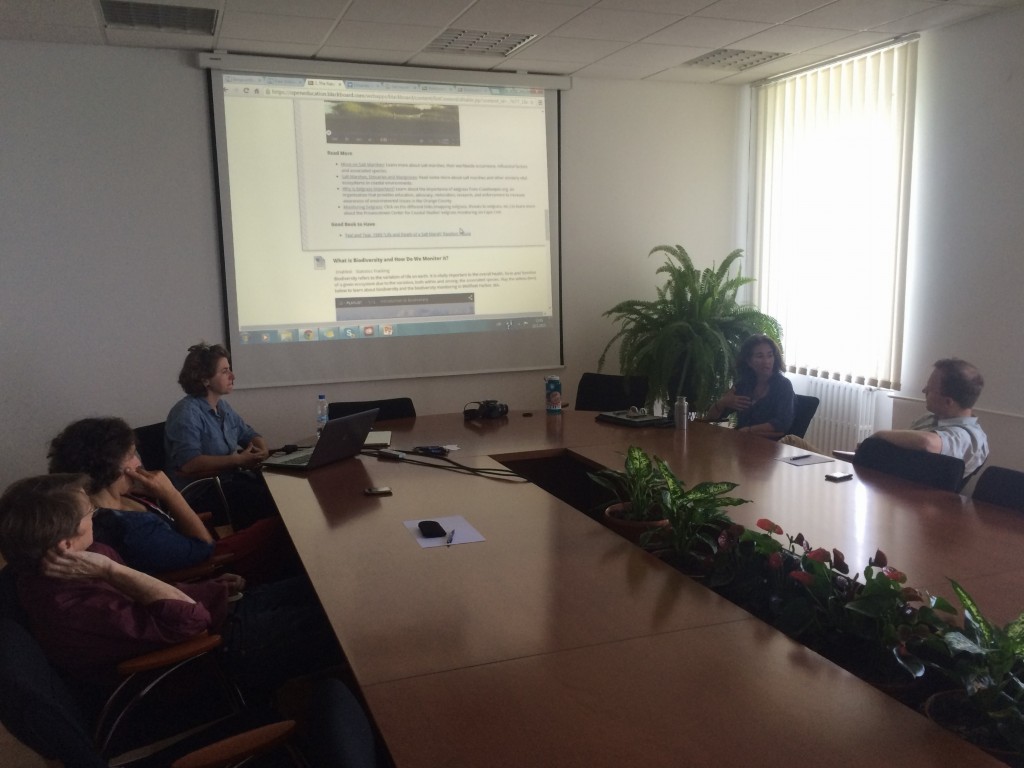Bringing the Kids to the LivingLabs
Everyday brings new and fun activities here in Zadar. For example, in order to help advance the ecoliteracy initiative we met with a group of 25 elementary school students from a local school Simun Bozicic Benje (don’t ask me to pronounce it…). We feel that it is important to not only promote education in a university setting, but also to the community at all age groups. As Claudia Kruschel was gathering samples of various marine plants and animals in the Brodarica Cove, the kids began to walk up to us in a single file along the stonewall adjacent to the water. Led by their teacher, they made their way to sit with their feet dangling over the edge of a little ‘amphitheater’ made out of boat docks. The setting was almost perfect (apart from the nearby construction).
- Students from elementary school Simun Bozicic Benje arrive at Brodarica Cove to learn about biomimicry (photo: Rrezarta Hyseni)
- Students from elementary school Simun Bozicic Benje learn about biomimicry from Anamarija Frankic and Claudia Kruschel (photo: Rrezarta Hyseni)
- Students from elementary school Simun Bozicic Benje learn about biomimicry from Anamarija Frankic and Claudia Kruschel (photo: Deniz Bertuna)
- Students from elementary school Simun Bozicic Benje learn about biomimicry from Anamarija Frankic and Claudia Kruschel (photo: Deniz Bertuna)
Anamarija and Dr. Kruschel were the center of attention showing various samples of the local fauna and flora to the class. The students absolutely loved being out in this local environmental setting learning in the LivingLab about their surroundings and Biomimicry. They were also highly inquisitive. For example, when asked about what these critters need to be ‘happy’, one student said (in Croatian) ‘oxygen, food and health’. The topic then shifted into talking about the health of the coastal environment in this Cove.
Behind the students the major road construction was going on to finalize the storm and waste water piping along the shoreline. As mentioned in the past blog post, Brodarica Cove has been largely altered by the construction of roads and artificial walls resulting in losses in biodiversity and decreases in water quality. Anamarija then began by telling them about how in nature water can be cleaned and how shellfish are important part of our coastal systems. She asked them what they can learn from a blue mussel (dagnja) that she pulled out from water, or from a local sea cucumber (trp)? Kids answers were all about sea food for us humans, so they learned that marine flora and fauna clean the sea, provide oxygen, and teach us how to design the strongest and healthiest glue like the one from blue mussels or oysters (PureBond product). We also talked about sharks and what we can learn from them, specifically their skin, which is resistant to bacteria. Through biomimicry this important skin design and function is applied by the Sharklet Technologies to protect hospital surfaces from contamination.
All in all, the students seemed to enjoy their little field trip to the cove. For their age they were certainly asking some important questions and seemed concerned about their local environment and how can they help. It was a rewarding experience for us, despite the fact that only Anamarija could understand what they were saying!
Sharing Our Initiative with UNIZD
In the afternoon we met with three UNIZD professors to share our experience with open online education (MOOC’s) and the importance of online learning. Such platforms are rather foreign to Croatian academia not because of a lack of interest, but more due to a lack in resources. We would love to help expand what we’ve learned in online education and help promote UNIZD’s online initiative.
We presented why and how we were able to accomplish what we did with the three offerings of the Coasts & Communities: the first offering was restricted to a five-week course, the second was for UMass credit associated with an introductory course that we redesigned to incorporate lab components and the third was set for a more self-paced offering. We also shared the challenges faced throughout all parts of production, what we did/what we would do differently and answered questions pertinent to UNIZD and how they may be able to include such courses into their curriculum. After all, the use of online and open education is not only beneficial to the community and individuals wishing to expand their knowledge, but it also provides incentive to institutions like UMass and UNIZD to help gain support and even corral in prospective students.




